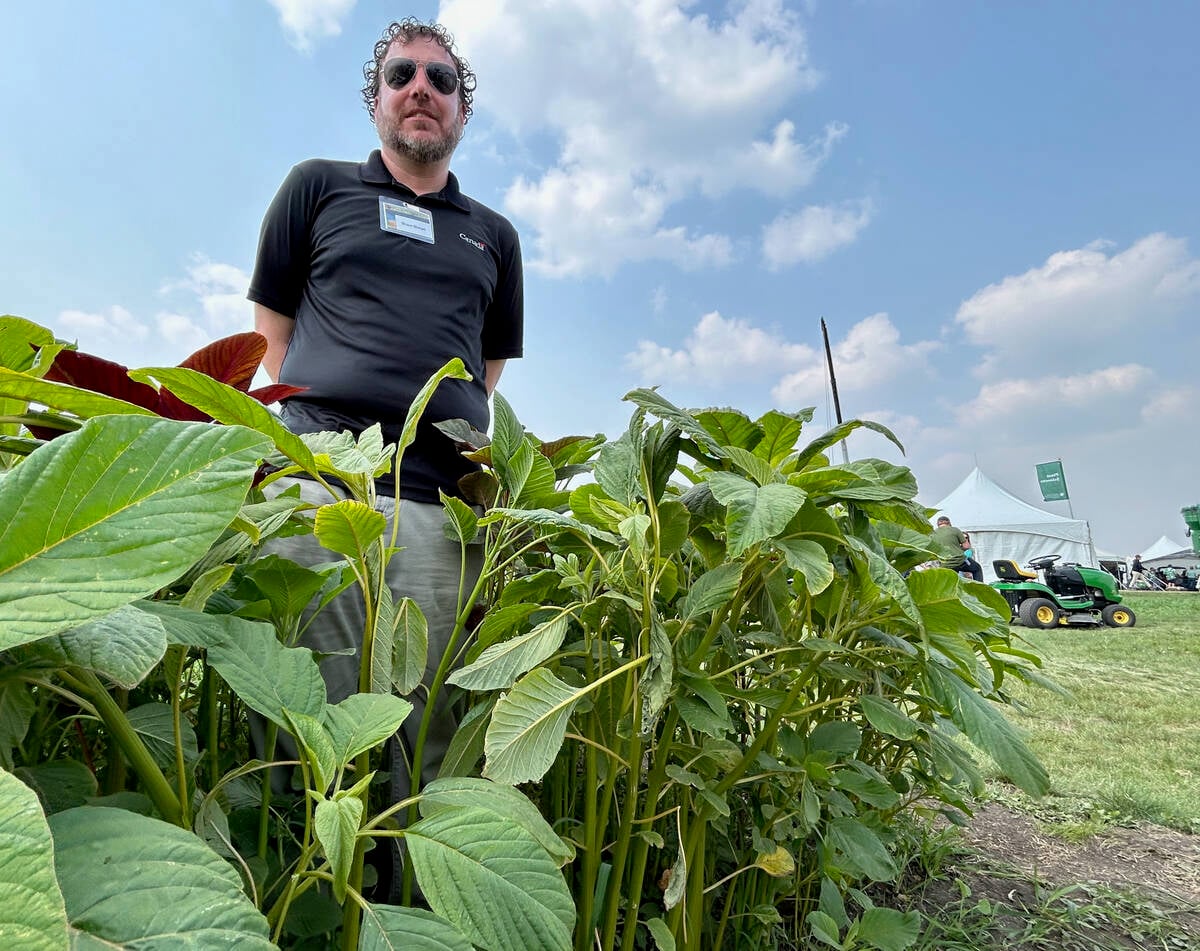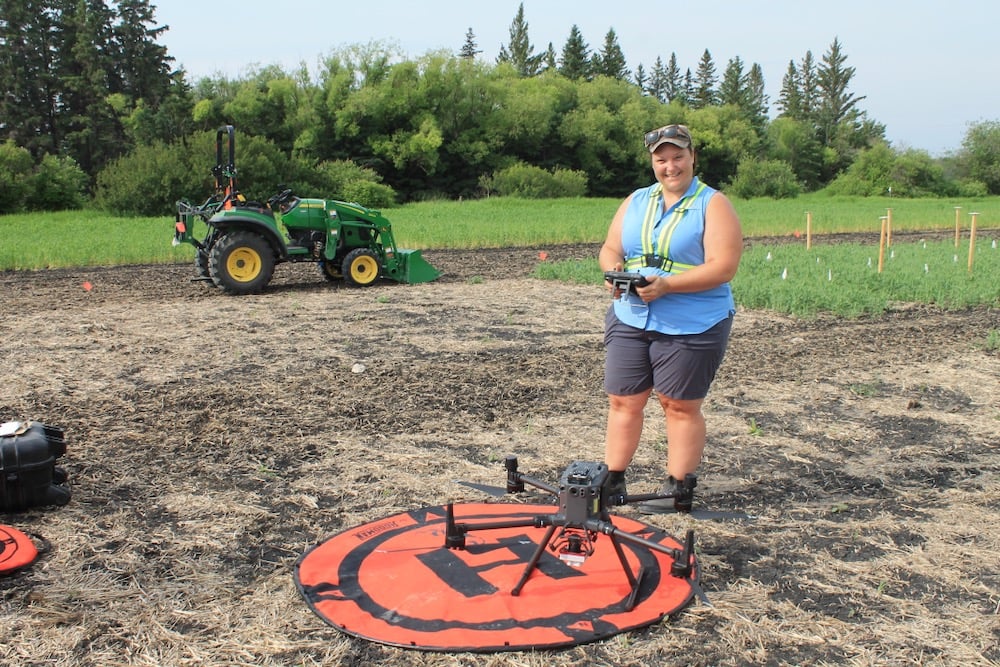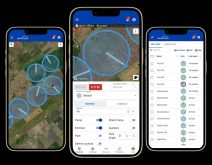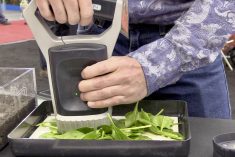High-tech innovations aimed at improving farming are being developed all the time — and while there are always some producers keen to try out new tech, that’s certainly not the case for everyone.
Many farmers will prefer to wait and see — which is where places like Innovation Farms come in.
Enterprise Machine Intelligence and Learning Initiative (EMILI) is a Manitoba-based non-profit working to expand the business of digital agriculture in Canada. It runs Innovation Farms to provide a working farm venue where new high-tech tools can be tested and validated.
Read Also

Glufosinate-resistant waterhemp appears in U.S. Midwest
News of glufosinate-resistant kochia in the U.S. is concerning as farmers are losing options to control waterhemp, also of the pigweed family.
That venue is Rutherford Farms, a 5,500-acre commercial seed operation just north of Winnipeg, at Grosse Isle, Man.
EMILI’s vision for Innovation Farms — and the support it receives from Farm Credit Canada’s AgExpert farm management software unit — led to a similar initiative being launched by Haggerty AgRobotics and RHA Ventures in Ontario this past September.
Reduce risk for farmers
A main objective of EMILI’s Innovation Farms is to increase the comfort level for farmers and reduce risks associated with new digital ag solutions.
Grainews spoke to Innovations Farms’ manager Danielle Bérard about that, during a break at EMILI’s Agriculture Enlightened 2023 conference in Winnipeg in October.
“Sometimes it’s hard to stick your neck out when you’re trying to adopt new technologies,” she said. “Questions farmers are always going to ask are: one, does it make money; two, is it simple; and three, does it perform on my neighbour’s farm, or work in my area?
“At Innovation Farms, we can help take away that risk from farmers as we take on new technologies and validate them on the farm. We share what we learn and hopefully that makes them more comfortable when it comes time to adopting those technologies.”
Bérard said producers appreciate the value of demonstrating innovations at a real-world farm scale.
“Farmers have all seen small plot work, and having this field-scale research resonates a lot more with them when it comes to making decisions on things like what technologies they want to buy,” she said.
One important difference between small-plot and field-scale research is the kind of equipment used. Machines used in small plots are specialized and smaller, Bérard said, whereas research at Innovation Farms uses commercial ag equipment and relies on farmers’ agronomic practices and techniques.
According to Bérard, this means Innovation Farms can help show how new technologies are sustainable, productive and profitable at the farm level and address other issues, such as the privacy and security of farm data and the interconnectivity of digital devices.
“Those are all things that farmers are concerned about. What we hope to deliver is farmer-centric solutions,” she said. “At the end of the day, we want to be able to support farmers in making the best decisions that they can.”
‘Innovative thinker’
Researchers, she said, can access multiple years of historical data and on-farm trial results at the Manitoba farm site, thanks to Rick Rutherford, the innovative owner of Rutherford Farms and a staunch supporter of EMILI.
“Rick is a great guy. He’s an innovative thinker,” says Bérard. “He farms as he would normally, and we sprinkle in field-scale projects here and there.”
Research findings at Rutherford Farms are disseminated in various ways, including field tours and field days.
“We’ve had over 350 people come through the farm this summer from various different backgrounds, not only farmers,” Bérard said, adding a newly built Innovation Farms Centre is opening soon to host events and provide showcases for the different technologies used around the farm.
Innovation Farms also shares what it learns with other members of the Pan-Canadian Smart Farm Network.
“We collaborate on similar projects, and we disseminate that knowledge to farmers any chance we get,” said Bérard.
“For next year, I’m hoping that we can increase our collaborations with other smart farms. We’ll likely be working on different things like weather and disease models and forecasting. We’ll also have projects revolving around computer vision (and) remote sensing.”
EMILI had been conducting research at Rutherford Farms for three years prior to Innovation Farms’ official launch in 2022.

One collaboration with University of Winnipeg researchers resulted in an algorithm used to identify different varieties of plants. The algorithm was developed from a database of millions of labelled images of Prairie crops and weeds imaged on Rutherford Farms.
Recent examples of tech solutions being tested at Innovation Farms include InputsPro, a new mobile app that makes it easier for farmers to access crop protection data. An article on InputsPro appeared in the Dec. 5, 2023 issue of Grainews.
You can also read about how Innovation Farms is helping assess a new tool from Geco Engineering that can be used to predict weed locations and detect emerging herbicide resistance within fields, in the July 11, 2023, issue of Grainews.
An EMILI video on Innovation Farms can be found here.
Panel discussion
Grainews also spoke to EMILI’s managing director, Jacqueline Keena, who hosted a panel discussion on Innovation Farms during the Agriculture Enlightened conference.
“We’re just at the conclusion of our first growing season … and we have more than 22 project collaborators out on the farm doing … different projects to grow the digital ag industry and to develop all sorts of new innovations, be it software or hardware technologies,” she said.
The Innovation Farms panelists included Rutherford as well as Ray Bouchard, CEO of Enns Brothers, a major Manitoba ag equipment dealer, who also chairs EMILI’s board of directors.
Bouchard talked about how the work being done at Rutherford’s farm has created a unique micro-ecosystem centred around ag innovation and opportunities.
“We already have examples in year one where we’ve got companies that came to the farm to test out new technologies that have gotten into ideation with some of the other companies, and they are now working collaboratively and are working at putting together new technologies. That’s just an example in a very small micro-ecosystem that we’ve been able to create,” he said.
“The vision of getting Canada to a place where it’s seen as the leader in the world around innovation that (enhances) productivity, profitability and sustainability for agriculture … there’s no reason we can’t get there.
“What we’ve done is we’ve created this foundation and now we need to grow it,” Bouchard added. “We want to bring into the tent as many companies, innovators, farmers who want to participate (as we can).”
















